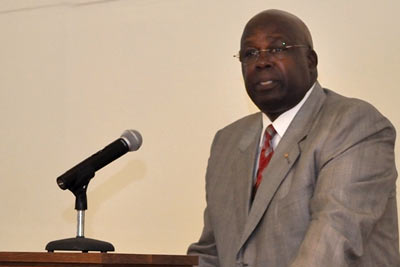Allen shares secrets to turning around failing hospitals
By Ted Boscia

In three decades as a hospital administrator, Percy Allen II, MPA '75, gained a reputation for reviving moribund health care organizations, leading unlikely turnarounds of money-losing hospitals in Detroit, New York City and Baltimore.
In a speech titled "Not Under My Watch," he shared his secrets for resurrecting ailing hospitals with Sloan Program in Health Administration students, professors and alumni at its annual Wagner Memorial Dinner May 5.
"No hospital has taken its last breath under my watch," said Allen, elected to Modern Healthcare's Health Care Hall of Fame in 2011, five years after retiring from the business.
The most stunning reversal of fortune led by Allen arguably came when he was president and CEO of Bon Secours Baltimore Health System. When he joined the hospital in 1999, it was losing close to $10 million annually and was the worst performer in the Bon Secours system. At the end of his tenure in 2006, the hospital was in the black and had instituted new programs and improved in patient satisfaction, quality of care and other measures.
"We had gone from the very bottom to the top quarter [of Bon Secours hospitals]," Allen said.
Rescuing financially troubled hospitals, Allen said, starts with "cheerleading." "The first step in changing the downward trend of a hospital is changing the attitude of the people working there," he added. "People naturally want to be on the winning team. And if it looks like yours is indeed winning, that is the place they will gravitate to."
Creating such change isn't easy, Allen conceded. He stressed that instilling values of "respect, honesty and openness" between hospital leaders and employees helps to overcome initial skepticism and negative attitudes.
In addition to energizing staff and doctors, Allen emphasized that neighborhood pride makes a major difference. When a hospital goes downhill, ties to the community also deteriorate. So restoring those relationships - by making the facility a welcoming place and expanding beyond traditional health care services - is critical to reversing course.
In turning around Bon Secours, Allen envisioned the hospital as a resource for the entire community - in sickness and in health. It added job training, child care, counseling for the homeless, financial literacy courses and more.
"I have always believed that a hospital holds a special place in the community - outside the church, generally it is one of the most stable institutions they have," Allen said. "People connect with it, because that is where they have to be at some of the most vulnerable times of their lives."
Fiscal discipline is also a key to recovery, Allen said. For money-starved hospitals, cutting costs helps, but Allen cautioned the audience about carving too close to the bone.
"The simple truth is you cannot be successful by cutting, cutting, cutting. Eventually you will get to the point where you cut yourself right out of business. The idea is to build, to build with what you have."
The Sloan Program's annual Wagner Weekend unites alumni, students and faculty. Other events included student research presentations, a student-alumni reception and a golf outing.
Ted Boscia is assistant director of communications for the College of Human Ecology.
Media Contact
Get Cornell news delivered right to your inbox.
Subscribe